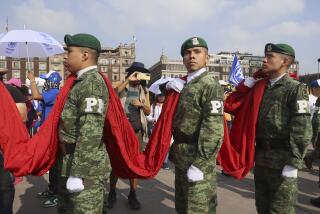Communist Courts Voters in Russia’s ‘Red Belt’
- Share via
VORONEZH, Russia — In a crowd of 5,000 workers gathered in a hangar of the Ilyushin aircraft factory to hear Communist Party presidential hopeful Gennady A. Zyuganov, half of the women were wearing the same fake-angora knit hat.
While such monotony was the style during the shortage-plagued Soviet era, its persistence in this hard-up industrial city is telling testimony to the failure of economic reform to reach Russia’s pro-Communist “red belt.”
In a blue-collar bastion such as Voronezh, where Zyuganov was stumping this week, choice and plenty have served only to demoralize government workers whose wages are sporadic and whose living standards are in an unbroken decline.
Zyuganov’s diatribe against democrats and the economic chaos that reform has created provoked assenting nods from the identically capped comrades, and he drew cheers from downtrodden pensioners with vows to, if not make it all better, at least make it no worse than it was when the Communists ruled.
But the current front-runner in the race to lead Russia may be making a strategic miscalculation in focusing his appeals for retreat on loyal regions like this one.
In the red belt, he is preaching to the converted.
Although most opinion polls show Zyuganov with a consistent 20% support among voters--at least two and as many as six percentage points ahead of incumbent President Boris N. Yeltsin--they also show that, with two months until the elections, the majority of Russians are undecided, equally unhappy with the status quo and with the prospect of a return to Communist power.
Since announcing his candidacy in February, Zyuganov has traveled to Siberia to denounce the lack of railroad construction, to Ryazan and Yekaterinburg to blame democracy for idle defense plants and to this aircraft-manufacturing center to highlight the suffering inflicted on workers by a government that cannot pay for as much as it has ordered.
“There are now 20 million unemployed in our country, 6 million refugees [from former Soviet republics] and 1 million homeless children--is this what we wanted?” the 51-year-old former teacher asked one crowd of supporters after another here. “They say we had long lines under communism, but the longest line now is for the graveyard.”
To restore the meager social benefits for which elderly Russians are now nostalgic, Zyuganov has promised state control of prices for transport, food, energy and education--subsidies that economists warn would require printing a lot of new money and thus quickly rekindle hyper-inflation.
This threat of prolonged, if not worsened, economic instability has made many undecided voters wary. They are predominantly educated Russians who can work out the economics and may choose the current stagnation as the lesser of two evils.
“The Communist Party has a big problem with its economics program, mostly because it doesn’t have one,” says Sergei Markov, a political analyst with the Moscow branch of the Carnegie Endowment for International Peace. “That makes people nervous when they hear rumors about a secret ‘maximum plan.’ ”
Retired Gen. Valentin I. Varennikov, who took part in the failed 1991 coup against Soviet President Mikhail S. Gorbachev and now is one of several dubious Zyuganov allies, alluded last month to a “maximum plan” for renationalizing private property should the Communists return to power.
And Yeltsin has been closing the gap with Zyuganov, skillfully casting his chief opponent as a destabilizing choice for Russia as the first signs of economic upturn are on the horizon.
“I just haven’t made up my mind yet,” said Nina Klyashnova, a 36-year-old bookkeeper at the Aviation-Construction Enterprise that Zyuganov visited in this provincial capital 300 miles southeast of Moscow. “[Zyuganov] sounded good, but all the candidates know how to tell us what we want to hear.”
In a brief interview, Zyuganov explained that his strategy is to work from his existing base of laborers and pensioners in hopes that his message will make its way through friends and family members.
“We expect to reach 10,000 people” in the Voronezh region, he said. “If you figure each of their families has about four members, we are really covering 40,000.”
But that arithmetic is suspect in a country politically split not only by income level but also by generations and gender.
Even in this relatively safe notch in the red belt, Russians wearied by a decade of upheaval greeted Zyuganov’s promises with reserve.
At a wreath-laying ceremony at a World War II memorial, Maria Kartashova trundled belligerently after the candidate to rail against today’s leaders and anyone thinking about becoming tomorrow’s.
“There’s no money, no pensions, no investment--nothing!” the elderly woman shrieked, swatting toward the departing Zyuganov as if at a fly. “And it’s not just Boris Nikolayevich [Yeltsin] at fault. All these politicians in their cozy seats are the same.”
Analysts contend that Zyuganov is off to a poor start in the campaigning, but with two months before the June 16 first round, any misstep by Yeltsin could quickly turn around the momentum.
But Zyuganov too carries the burden of having to hold up under prolonged scrutiny and an ambitious travel schedule.
“He has become just like Yeltsin,” local Communist Party information chief Sergei I. Rudakov complained after Zyuganov abruptly canceled a visit to the city open-air market. “He has become totally unpredictable.”
More to Read
Sign up for Essential California
The most important California stories and recommendations in your inbox every morning.
You may occasionally receive promotional content from the Los Angeles Times.














